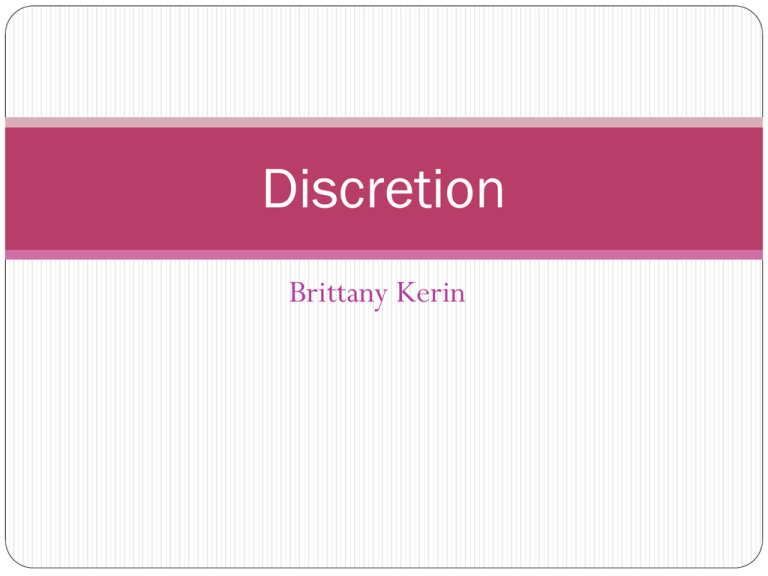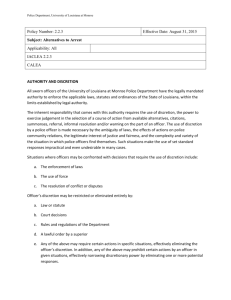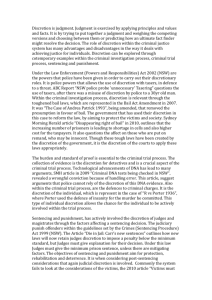Discretion
advertisement

Discretion Brittany Kerin Discretion Discretion is the power or right to make official decisions and judgements, whilst using professional reason, to choose from among acceptable alternatives. Abuse of Discretion An abuse of discretion occurs when a decision made is: unacceptable does not achieve justice for both the individual and society. Unacceptable Decision A decision can be unacceptable because: it does not support the specific facts of the situation because it is arbitrary because it goes beyond the binding constraints of certain legal measures, including legislation such as the Crimes Act 1901. Judicial and Police Discretion Judicial discretion is the freedom judges have to decide legal matters, using their professional judgement, within the bounds of law and fact. Police discretion is the flexibility officers have in dealing with certain situations they encounter. Judicial Discretion The judiciary has the freedom to exercise a certain amount of discretionary power when making legal decisions; they must take into account the specific facts of each case determine the most suited outcome. Limits of Judicial Discretion Precedents set by previous cases in higher courts Specific judicial guidelines Maximum penalties Mandatory sentencing; in which the judges have no discretionary power at all, the Constitution Legislation: Crimes Act 1901, Crimes (Sentencing Procedure) Act 1999 (NSW) The Criminal Procedures Amendment Act 1986 Crimes Amendment (Mandatory Life Sentences) Act 1996 (NSW). Case: R v Dawes Daniella Dawes charged with the murder of her 10 year old son who suffered from severe autism; however Daniella suffered from severe mental illness. Initially on trial for murder Crown appealed to Criminal Court of Appeal Pled guilty for manslaughter basis of her plea was on the ground of ‘substantial impairment of her capacity by reason of an abnormality of mind arising from an underlying condition’, she had a major depressive illness Sentenced to a five year good behaviour bond Judge judge took into consideration the specific circumstances of Daniella’s situation and used his discretionary power to substantially lower Daniella’s sentence. Police Discretion Police have the power and freedom to exercise a certain degree of discretion. Police have the choice to enforce certain laws and how these laws will be enforced. Limits of Police Discretion Legislation Crimes Act 1901 The enactment of new laws (such as the mandatory arrest laws for domestic violence) The allocation of funds Certain prosecutorial policies set by the Director of Public Prosecutions Police policies Specific guidelines Limits of Police Discretion Legal entities authorised to test the discretion of a police officer when complaints are raised by individuals Anti-Corruption Commission the Ombudsman the Coroner the Director of Public Prosecutions Police Internal Affairs/Investigations Discretion Discretion raises issues of: Fairness Equality Allows for: Inconsistency Unpredictability Police Discretion When a police officer makes a decision and uses discretion, they must ensure that: the law is being applied with consistency that their decision is not fuelled by their personal context and individual views, so they are not being biased. Otherwise police can be discriminatory and have the power to target specific groups when applying and enforcing the law. Police Discretion Discretion allows for: a certain amount of leniency and vagueness within the law. Allows officers to apply what they believe to be the best response to each specific situation. Because every police officer is different, each officer’s response to a specific situation will vary. ‘Cop Sacked for Hanging out Small Fines’ Media article from the Sydney Morning Herald in November 2009. The article details Sergeant Mark Astons’ excessive use of discretionary power to ‘let off’ individuals caught speeding. Sergeant Ashton was sacked from the Victorian Police department for his use of discretion. A police spokeswoman stated that "All police officers are entitled to use discretionary powers when handling speeding offences, whether that be through the issue of infringement notices, cautions or other form of lawful action”. Police Discretion Due to the use of discretion and the lack of police resources many smaller minor offences go unpunished. Minor offences are not posing a direct threat and harm to society Through the continued use of police discretion and the lack the lack of consistency and efficiency in the enforcement of the law that more dangerous and serious offences occur. If police were to enforce every aspect of the law and not utilize their discretionary powers, the criminal justice system would not be able to handle it and police would not have the time to focus on the more dangerous and more serious crimes. Police Discretion There are not enough resources, including: Police Jails Courts Prisons, available to govern every aspect of the law Discretion enables police to focus on the more serious crimes The use of discretion can be seen by individuals as not achieving justice within society as the law is not being consistently and thoroughly regulated. Discretion Discretion has both positive and negative influences on the law and its effectiveness for achieving justice for both the individual and society. Through the correct use of discretion in the criminal justice system, the law and its effectiveness for achieving justice can be thoroughly achieved. Thank you






